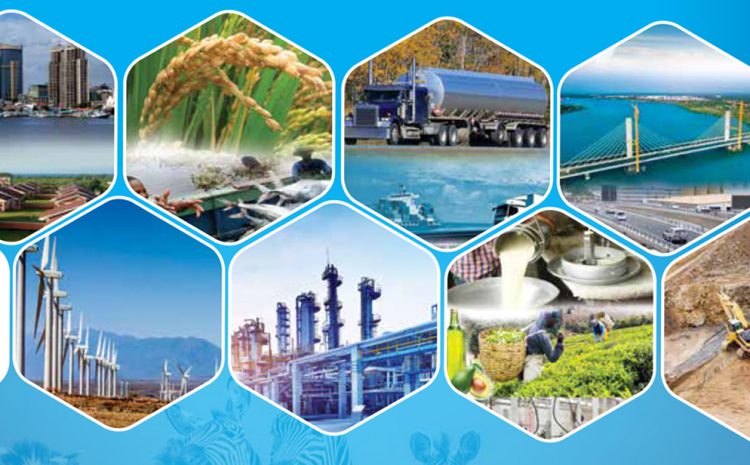Why Invest Tanzania ?

Investing in Tanzania offers compelling opportunities due to its strategic location, abundant natural resources, and favorable business environment. Here are key reasons why Tanzania is an attractive investment destination:
1. Strategic Location in East Africa
- Tanzania’s geographic position makes it a regional hub with easy access to other East African markets, including Kenya, Uganda, Rwanda, Burundi, and the Democratic Republic of Congo. With a coastline along the Indian Ocean, Tanzania has well-connected ports like Dar es Salaam, which facilitate trade with global markets, including Asia and the Middle East.
2. Growing Economy and Political Stability
- Tanzania’s economy has shown consistent growth over the past few decades, driven by sectors like mining, tourism, agriculture, and construction. The country has a stable political environment, with peaceful elections and a government committed to economic reforms. Stability is a crucial factor in attracting long-term foreign direct investment (FDI).
3. Rich Natural Resources
- Tanzania is blessed with vast natural resources, including minerals (gold, diamonds, tanzanite, and nickel), natural gas, and fertile agricultural land. These resources present attractive opportunities in sectors such as mining, energy production, and agribusiness. The government has also opened up opportunities for foreign investors in gas exploration and renewable energy.
4. Tourism Potential
- With world-renowned tourist attractions like the Serengeti, Ngorongoro Crater, Mount Kilimanjaro, and Zanzibar, Tanzania has a thriving tourism sector. Tourism generates substantial revenue and presents opportunities for investments in eco-tourism, hospitality, hotels, resorts, and infrastructure development.
5. Growing Infrastructure Development
- Tanzania is investing heavily in infrastructure, including roads, railways, and airports, to improve connectivity across the country and the region. Projects like the Standard Gauge Railway (SGR) and improvements to the Dar es Salaam port are set to boost trade and logistics. Infrastructure development opens doors for investments in construction, transport, and logistics.
6. Agricultural Opportunities
- Agriculture employs a significant portion of the Tanzanian population and accounts for a considerable share of the country’s GDP. With fertile land, favorable climate, and ample water resources, Tanzania is ideal for agribusiness ventures, including crop farming, horticulture, and livestock. Investment in agribusiness, processing, and agro-technology can yield high returns, especially with the government’s commitment to modernizing the sector.
7. Government Incentives and Support for Investors
- The Tanzanian government has introduced policies to promote investment, including tax incentives, duty-free import of capital goods, and repatriation of profits. The Tanzania Investment Centre (TIC) assists investors in navigating regulations and offers support through one-stop services. Additionally, Tanzania is a member of various regional economic communities, providing access to broader markets with reduced tariffs.
8. Rising Demand in Energy and Renewables
- Tanzania has a fast-growing energy demand, driven by urbanization, population growth, and industrialization. The country is rich in natural gas and has potential for renewable energy sources like hydro, solar, wind, and geothermal power. Investments in the energy sector, particularly renewables, are encouraged as Tanzania seeks to expand its energy capacity and reduce its reliance on traditional sources.
9. Youthful Workforce and Low Labor Costs
- Tanzania has a young, growing population, offering a large, trainable workforce at competitive wages. This demographic advantage is beneficial for labor-intensive industries like manufacturing and agriculture. The government has also focused on improving education and vocational training, increasing the availability of skilled labor for specialized sectors.
10. Integration with Regional Economic Communities
- Tanzania is a member of the East African Community (EAC) and the Southern African Development Community (SADC), providing access to an expanded market with over 300 million people. Membership in these communities facilitates cross-border trade and investment opportunities with reduced trade barriers.
11. Digital and Financial Sector Growth
- Tanzania’s ICT sector is expanding rapidly, with high mobile penetration and increased access to internet services. Financial inclusion is also improving, thanks to mobile banking and fintech solutions. Investment in fintech, telecommunications, and digital services can capitalize on the country’s growing digital ecosystem.
12. Pro-Business Reforms
- The Tanzanian government has initiated pro-business reforms to create a more favorable investment climate, including simplifying business registration and licensing processes, combating corruption, and enhancing transparency. These reforms aim to increase investor confidence and make it easier for businesses to operate.
13. Positive Investment Climate in Key Sectors
- Targeted sectors like mining, construction, manufacturing, and real estate present strong growth potential. For instance, there is high demand for affordable housing due to rapid urbanization, creating opportunities in real estate development. Additionally, there is a need for consumer goods manufacturing, allowing investors to tap into an underserved market.
Tanzania’s investment potential is significant, bolstered by its resources, youthful workforce, and government support. By capitalizing on these opportunities, investors can not only achieve strong returns but also contribute to the country’s ongoing economic development.
